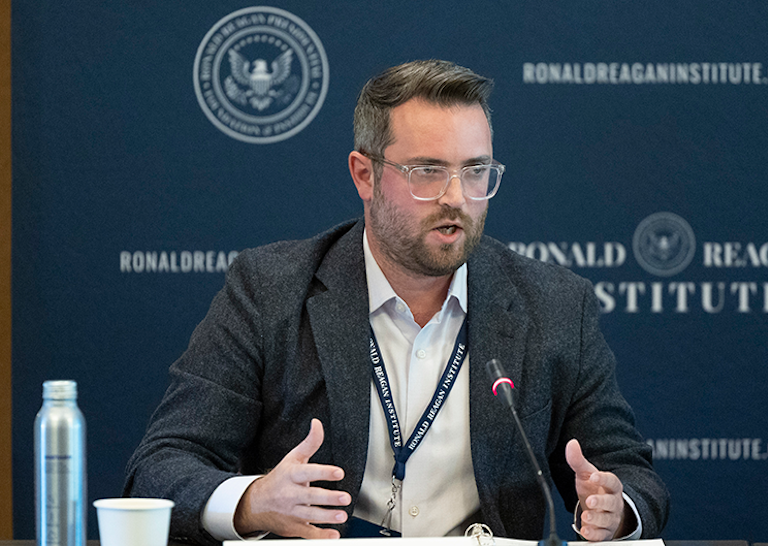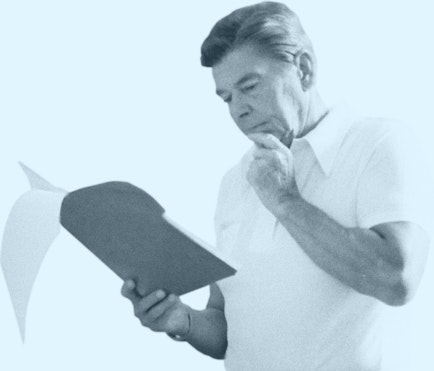Ronald Reagan Institute
Balance in the Indo-Pacific: Defining the U.S. Approach | A Response from Dustin Walker
By Dustin Walker

A Response from Dustin Walker
As we approach the 250th anniversary of American independence, we have only just concluded the first 10 years of our history in which America has identified the Indo-Pacific as the most important region in its foreign policy. Yet this seemingly revolutionary judgment has yielded—at best—evolutionary change.
The preeminence of the Indo-Pacific remains, as it was a decade ago, an aspiration rather than a reality. Perhaps no policy is so uniformly preached as it is unevenly practiced. Indeed, the continuity in America’s Indo-Pacific strategy over the last three administrations is measured not only by the consistency of its contents but by the inconsistency of its implementation.
As a radical new premise of American foreign policy, the preeminence of the Indo-Pacific has found surprising and sudden acceptance. Indeed, we have accepted the need to prioritize the Indo-Pacific so quickly that we never processed what it really meant to do so or reconciled ourselves to the difficult choices it demanded of us. We learned to say that the Indo-Pacific is America’s priority theater, and that China is America’s pacing threat. But these new beliefs never forced us to reconsider old ones or to recalibrate policy in other areas to meet our new reality.
Thus, the preeminence of the Indo-Pacific in American foreign policy is precarious—never more so than when events elsewhere around the world inevitably demand our attention.
* * *
What will Russia’s war against Ukraine mean for America’s Indo-Pacific strategy? Will it be the wakeup call we need to appreciate the risk and consequences of great power war and to get serious about rapidly restoring credible deterrence in the Indo-Pacific? Or will it lead us to conclude that prioritizing the Indo-Pacific will have to wait or even that it was a mistake in the first place?
At best, Russia’s war in Ukraine will remind us that peace is not guaranteed, that no continent is beyond the reach of war, that some tyrants believe conquest still pays, and that power politics is a reality of our present, not just of our past.
It will force us to confront unpleasant truths about the limits of American power, the magnitude of the challenge posed by China, and the unforgiving realities of a potential conflict over Taiwan.
It will drive us to elevate the Indo-Pacific in our domestic political dialogue, to embrace more fully the power and potential of our alliances, and to exploit the asymmetric advantages of seeking balance in a peaceful status quo rather than dominance in a new normal imposed by force.
And it will instill a desperately needed sense of urgency. The “decade of concern” is today, not tomorrow. The time to prepare for it was yesterday, not today. We need not despair, but we must not delay. We need immediate action to deter war and preserve peace in the Indo-Pacific. We need robust and dedicated funding for the Pacific Deterrence Initiative—just like the European Deterrence Initiative enjoyed for years. We need to extend a multi-year, multi-billion-dollar foreign military financing (FMF) commitment to Taiwan—just like we have done for Israel. And much, much more.
We must not allow Russia’s war in Ukraine to alter America’s Indo-Pacific course.
Yes, America is a global power, not a regional power. But America cannot maintain its status as a first-rate global power if it becomes a second-rate regional power in the Indo-Pacific.
Yes, China is a global challenge. But America will be most effective in countering China's global influence by preventing it from achieving preeminence in the Indo-Pacific.
Yes, the Indo-Pacific is a long-term priority, but it must also be a near-term one. Yes, China is a long-term challenge, but it is also an acute threat.
If we treat the Indo-Pacific as important but not urgent, it will amount to neither.
* * *
How can conservatives lead America to realize the ambitions of its Indo-Pacific strategy?
Conservatives should begin with advantages: an appreciation of the indispensable role of military power in international relations, an understanding that military power is a finite resource, and a recognition that America’s military advantage has dangerously eroded. But America’s Indo-Pacific strategy requires more than restoring the foundations of American military power.
A conservative foreign policy can distinguish itself through intentionality in resolving the tensions, which, as Michael Green has written, have characterized America’s Indo-Pacific strategy since the Founding. Those tensions include:
Asia vs. Europe. For most of our history, American strategy in the Indo-Pacific was constrained by foreign policy imperatives in Europe and, more recently, in the Middle East. Now the reverse must be true. That means recognizing we cannot afford to pursue siloed or maximalist approaches to threats like Russia and Iran. At the same time, recognizing the need for tough choices is not the same as making them. Conservatives need to dwell less on the tradeoffs we face and invest more energy in the formulation of politically sustainable and resource efficient alternatives to securing America’s enduring interests in Europe and the Middle East.
China vs. Japan (and others). In the modern era, the center of America’s regional strategy has shifted back and forth between China and Japan. Today, a successful Indo-Pacific strategy must center not on China, but on allies and partners. We are right to focus on alliances with Japan and Australia, strategic partnership with India, and frameworks such as Australia–United Kingdom–United States Partnership (AUKUS) and the Quadrilateral Security Dialogue (Quad). But conservatives should also challenge ourselves to lead in areas too long neglected, especially reinvigorating our alliances with the Philippines and Thailand, advancing partnerships with Indonesia and Vietnam, and reimagining our relationship with Pacific Island states.
Defining our forward defense line. From the Monroe Doctrine to the age of imperialism to the Cold War, American strategists have struggled to define the line that our adversaries must not cross, at times with disastrous consequences. Today, America’s forward defense line must include Taiwan. America’s stated policy may remain ambiguous. But our purpose and urgency must be clear: we will meet our commitment under the Taiwan Relations Act to maintain our capacity to resist any resort to force.
Self-determination vs. universal values. As Alex Wong writes, a sustainable Indo-Pacific strategy must “strike the American people as true and faithful to our ideals.” At the same time, a successful Indo-Pacific strategy must demonstrate to regional states—most of which are not liberal democracies—that America shares their interests. This is a difficult balance to strike. What is clear is that American support for sovereignty, democracy, human rights, and good governance must be articulated and implemented consistently and respectfully. Defending our values is not the same as imposing them. At the very least, we must not hold Indo-Pacific allies and partners to a different standard than we hold (arguably more problematic) Middle East states. Ultimately, we must not forget that we are competing for influence in Indo-Pacific states to counter the greatest threat to American ideals around the world: the spread of Chinese communist influence.
Free trade vs. protectionism. It is difficult to imagine a successful Indo-Pacific strategy without a more robust trade component. Before taking on large multilateral free trade arrangements, including the Comprehensive and Progressive Agreement for Trans-Pacific Partnership (CPTPP), conservatives need to demonstrate trade can deliver economic benefits to the American people with smaller, bilateral agreements. As Wong notes, there are plenty of opportunities to do so. Indeed, amid high inflation, conservatives should remind the American people that protectionism raises prices and freer trade lowers them. Most importantly, America must distinguish friend from foe on trade. Tarring allies and partners with the same brush as China is unjustified and counterproductive.
* * *
An American foreign policy that prioritizes the Indo-Pacific is a relatively new phenomenon in history. But time-tested conservative principles provide the surest path to security and prosperity in America’s Pacific Century.
Join Our Newsletter
Never miss an update.
Get the latest news, events, publications, and more from the Reagan Institute delivered right to your inbox.
